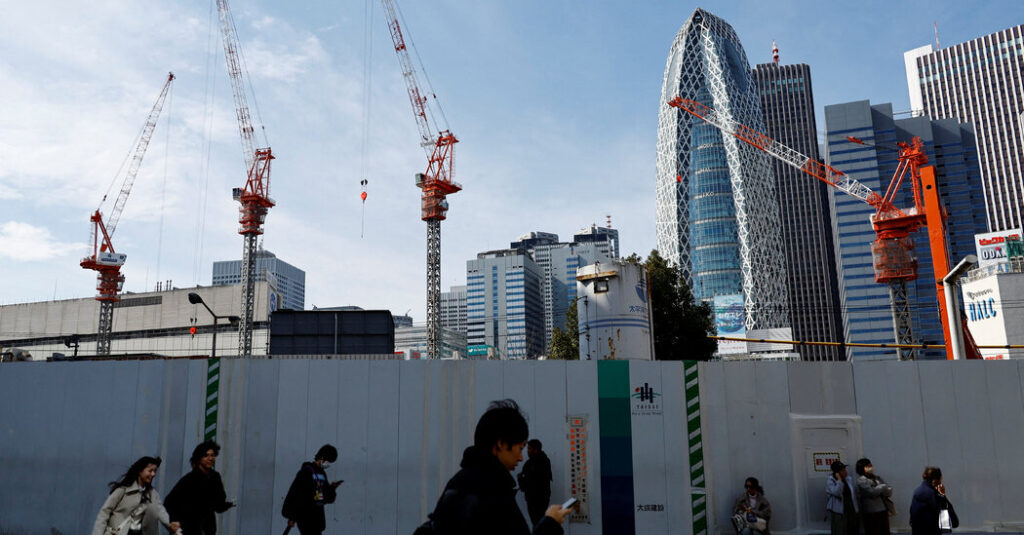Japan's economy shrank at the end of last year, pushing the country into recession, contrary to expectations for moderate growth.
Japan's economy unexpectedly slumped in the fourth quarter as a result of slowing spending by businesses and consumers struggling with the highest inflation in 40 years, a weak yen and rising food prices.
The end of the year brought yet another anticipated moment. Japan's economy, currently slightly smaller than Germany, has fallen a notch to become the world's fourth largest economy.
On an annualized basis, gross domestic product (GDP) fell by 0.4% from October to December, after a revised 3.3% decline in the previous three months. Economists had expected growth in the fourth quarter to be about 1%.
These numbers cloud the outlook for Japan's economy. Corporate profits are at record highs, the stock market is soaring, and unemployment is low. But the economy's two main drivers, consumer spending and business investment, have lagged.
Shinichiro Kobayashi, chief economist at Mitsubishi UFJ Research & Consulting, said the economy is becoming “polarized” due to high prices. As corporate profits soar, prices also rise, but wages haven't kept up and consumers are holding back on spending, he said.
The big question is whether Japanese workers will be able to achieve significant wage increases this year.
“The ball is in the corporate sector's court,” Kobayashi says.
Two consecutive quarters of negative growth means the economy is technically in recession, but these numbers are preliminary. A sufficiently large revision could invalidate the recession label.
Weak economic data also complicate the Bank of Japan's future decision on whether to proceed with its first interest rate hike since 2007.
Japan's central bank has stubbornly maintained policies aimed at keeping interest rates low and encouraging spending, a vestige of a long battle to combat deflation. Many economists had speculated that the central bank could eventually change course as early as April if economic fundamentals appeared to be strengthening.
Economic growth will remain “sluggish” this year, but disappointing fourth-quarter numbers will prompt the Bank of Japan to lift negative interest rates in April, Marcel Thielient, head of Asia Pacific at Capital Economics, said in a research note. He said he “doubts'' that he would do so. Year.
One of the problems for central banks is that the yen continues to be weak. A decline in the purchasing power of the currency means that the prices of goods imported into Japan will rise, increasing the inflationary pressures felt by consumers. But it tends to help the bottom line of many large Japanese companies that sell products overseas and bring the overseas profits home in yen.
The Bank of Japan's policy has further accelerated the depreciation of the yen by sticking to policy in recent years, even as the European Central Bank and the Federal Reserve have raised interest rates. This makes it attractive for global investors to borrow yen at very low interest rates in Japan and invest that money in dollars or euros at much higher interest rates in the West.
Saisuke Sakai, senior economist at Mizuho Research & Technologies, said the domestic economy will contract again in the first three months of this year due to the disruption caused by the January earthquake that shook western Japan, a region rich in manufacturing. He said it was highly likely.
If that happens, consumer sentiment may worsen further.
Mr. Sakai said, “If there is negative growth for three consecutive quarters, you will start to wonder, “Is the Japanese economy really in good shape?''''
With the release of year-end gross domestic product (GDP) statistics, Japan has lost its position as the third largest economy after the United States and China since it was overtaken by China in 2010. Germany currently holds that distinction with respect to the US dollar, which is the main currency used in world trade and finance.
In fact, the German economy is also in a slump. Russia's decision to halt purchases of cheap Russian natural gas and oil in the wake of its invasion of Ukraine has caused energy costs to rise sharply, even as the country shifts suppliers to places like the Middle East and the United States. ing.
Japan could lose its fourth place in the coming years as a shrinking population makes it difficult to keep up with the growth of India, the world's most populous country.
keith bradshire Contributed to the report.


